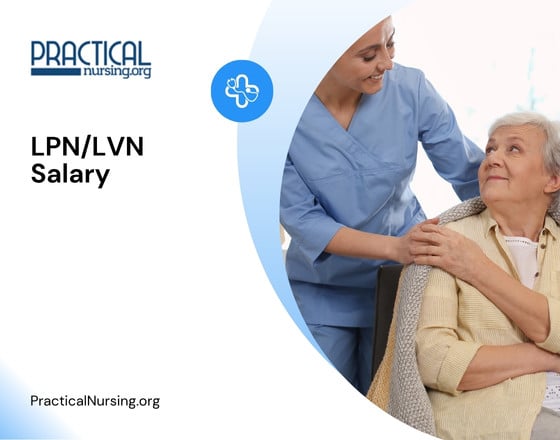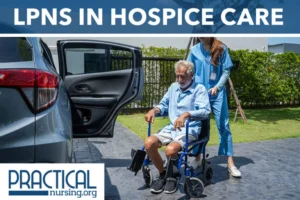LPNs in Hospice Care


LPNs in Hospice Care: A Rewarding Career Path for Compassionate Caregivers
 Licensed Practical Nurses (LPNs) play a vital role in hospice care, providing compassionate support to patients and families during one of life’s most challenging transitions. For nursing students considering career options, hospice care offers a unique opportunity to make a profound difference in patients’ lives while utilizing a diverse set of clinical and interpersonal skills. This growing specialty allows LPNs to work with interdisciplinary teams in various settings, from patients’ homes to dedicated hospice facilities.
Licensed Practical Nurses (LPNs) play a vital role in hospice care, providing compassionate support to patients and families during one of life’s most challenging transitions. For nursing students considering career options, hospice care offers a unique opportunity to make a profound difference in patients’ lives while utilizing a diverse set of clinical and interpersonal skills. This growing specialty allows LPNs to work with interdisciplinary teams in various settings, from patients’ homes to dedicated hospice facilities.
Read on to expore the essential role of LPNs in hospice care, the educational pathways to enter this specialty, and specific strategies for new graduates to successfully transition into this rewarding field.
Learn more about how to become an LPN or LVN.
The Role of LPNs in Hospice Care
Core Responsibilities
In hospice settings, LPNs provide direct patient care focused on comfort and quality of life rather than curative treatment. Key responsibilities include:
- Administering medications for pain and symptom management
- Performing regular assessments to monitor symptom progression
- Providing personal care and ensuring patient comfort
- Documenting changes in condition and response to interventions
- Educating family caregivers on basic care techniques
- Collaborating with the interdisciplinary hospice team
- Providing emotional support to patients and families
Unlike many other healthcare settings, hospice care emphasizes holistic support that addresses physical, emotional, and spiritual needs of both patients and their loved ones.
Work Settings
LPNs in hospice care practice in diverse environments:
- Home-based hospice: Providing care in patients’ residences
- Inpatient hospice units: Working in dedicated hospice facilities
- Nursing homes: Delivering hospice services within long-term care settings
- Hospitals: Supporting hospice patients in dedicated wings or units
This variety offers flexibility in work environment while maintaining focus on end-of-life care.
Educational Pathway for Hospice LPNs
Basic Requirements
The foundation for becoming a hospice LPN includes:
- Complete an accredited LPN program: Programs typically take 12-18 months to complete and include both classroom instruction and clinical rotations.
- Pass the NCLEX-PN exam: This national licensing examination is required to practice as an LPN in all states.
- Obtain state LPN/LVN licensure: Requirements vary by state but generally include passing the NCLEX-PN and completing background checks.
Specialized Education Focus Areas
While in your LPN program, focus on developing knowledge and skills particularly relevant to hospice care:
- Pharmacology: Pay special attention to pain management medications, anti-anxiety drugs, and comfort measures
- Geriatric nursing: Since many hospice patients are elderly, understanding age-related changes is crucial
- Mental health nursing: Develop skills in supporting patients and families through grief and loss
- Wound care: Many end-of-life conditions involve wound management needs
- Clinical assessment: Hone skills in recognizing subtle changes in patient condition
Request clinical rotations in settings that will expose you to relevant patient populations whenever possible.
Preparing for Hospice Care as a New LPN Graduate
Specialized Training and Certification
After completing your LPN program, consider these additional credentials to enhance your hospice care qualifications:
- End-of-Life Nursing Education Consortium (ELNEC) training: Offers specialized education in palliative care principles
- Hospice and Palliative Licensed Nurse (HPLN) certification: Available through the Hospice and Palliative Credentialing Center after gaining experience
- IV therapy certification: Important for administering comfort medications
- Wound care certification: Beneficial for addressing skin issues common in hospice patients
While not all of these are immediately available to new graduates, setting goals to obtain them demonstrates commitment to the specialty.
Developing Essential Skills
Beyond clinical knowledge, successful hospice LPNs cultivate:
- Exceptional communication skills: The ability to discuss difficult topics with sensitivity
- Emotional resilience: Strategies for managing grief while maintaining compassion
- Cultural competence: Understanding diverse perspectives on death and dying
- Family education abilities: Skills in teaching caregivers to provide basic care
- Interdisciplinary collaboration: Working effectively with social workers, chaplains, volunteers, and other team members
Consider volunteering with hospice organizations during your LPN program to develop these skills before graduation.
Finding Your First Hospice Position as a New Graduate
Entry Strategies
While some hospice positions require experience, new graduates can pursue several pathways:
- Internship programs: Some hospice organizations offer structured orientation programs for new nurses
- Part-time positions: Consider combining hospice work with another nursing role initially
- Home health experience: Working in home health can provide relevant skills and potentially transition to hospice
- Long-term care: Nursing homes with hospice units offer valuable experience with similar patient populations
Networking with hospice professionals during your education can help identify organizations open to new graduates.
Standing Out as an Applicant
To improve your chances of securing a hospice position as a new graduate:
- Highlight relevant clinical experiences from your LPN program
- Emphasize transferable skills from previous careers or volunteer work
- Obtain additional certifications like Basic Life Support (BLS) or IV therapy
- Volunteer with hospice organizations to demonstrate commitment
- Showcase your communication abilities during interviews
- Express your genuine interest in end-of-life care and comfort-focused nursing
Career Growth and Development
Advancement Opportunities
LPNs who excel in hospice care can pursue several career advancement paths:
- Team leadership roles coordinating care for groups of patients
- Staff education positions training new hospice team members
- Specialization in specific populations like pediatric hospice or dementia care
- Advancement to RN through LPN to RN bridge programs while continuing in hospice
Many hospice organizations offer tuition reimbursement and flexible scheduling to support educational advancement.
Hospice Care: A Niche Role for LPNs
Hospice care offers LPNs a deeply rewarding career path that combines clinical skills with compassionate human connection. For those drawn to making a meaningful difference during a critical life transition, few nursing specialties provide the same depth of purpose and connection with patients and families.
By focusing your educational preparation on relevant clinical knowledge, developing strong communication skills, and seeking opportunities to gain exposure to end-of-life care during your LPN program, you can position yourself for success in this growing specialty. Hospice nursing challenges practitioners to provide the highest quality of life possible during patients’ final journey—a calling that many LPNs find profoundly fulfilling throughout their careers.
Related Articles
- Most Affordable LPN/LVN Programs for 2026: Your Path to Nursing Success on a Budget
- LPN / LVN History & Background
- LPN to RN Bridge Programs: Accelerating Career Growth for Practical Nurses
- You Will ALWAYS Be Learning!
- Nursing in Long Term Care
- Full Time Mother and LPN
- Culture of LPNs and RNs in Team Nursing
- How to Prepare for Your LPN/LVN Program Entrance Exam